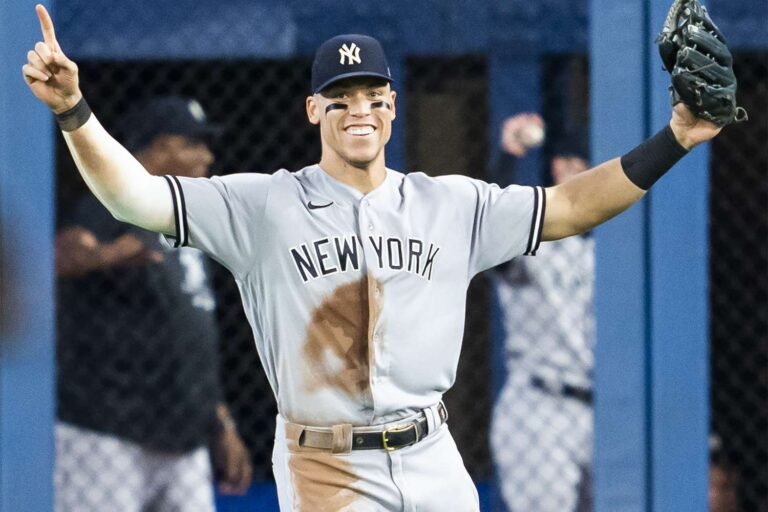In the world of Major League Baseball (MLB), few players command attention and admiration quite like Aaron Judge. As a cornerstone of the New York Yankees’ lineup, Judge’s towering presence on the field and formidable skills at the plate have solidified his status as one of the game’s premier talents. Central to Judge’s impact on the baseball landscape is his contractual agreement with the Yankees, a subject of immense interest and speculation among fans and analysts alike. This article provides an in-depth examination of Aaron Judge’s contract, shedding light on its terms, implications, and the broader context of player compensation in professional baseball.
Aaron Judge: A Rising Star in MLB:
Before delving into the intricacies of his contract, it is essential to understand the trajectory of Aaron Judge’s career and his significance within the MLB. Since bursting onto the scene in 2016, Judge has captured the imagination of baseball enthusiasts with his prodigious power, exceptional athleticism, and unwavering dedication to excellence. From winning the American League Rookie of the Year award in 2017 to earning multiple All-Star selections, Judge’s impact transcends statistical achievements, embodying the spirit of a true franchise player for the Yankees and a role model for aspiring athletes worldwide.
The Importance of Aaron Judge’s Contract:
Against the backdrop of his on-field exploits and widespread acclaim, Aaron Judge’s contractual status with the New York Yankees assumes paramount importance for both the franchise and the player himself. As one of the league’s most recognizable and marketable stars, Judge’s contract not only dictates his compensation but also influences roster decisions, team dynamics, and long-term strategic planning for the Yankees organization. Furthermore, Judge’s impending free agency looms large, raising questions about his future with the team and the potential implications for the broader MLB landscape.
Examining the Terms of Aaron Judge’s Contract:
While specific details of Aaron Judge’s contract are not publicly disclosed due to confidentiality agreements, several key aspects can be inferred based on industry standards and precedents. Typically, MLB contracts encompass a range of provisions, including salary terms, performance incentives, contractual bonuses, and provisions for arbitration and free agency. Given Judge’s stature within the league and his contributions to the Yankees’ success, his contract is likely to reflect a lucrative compensation package commensurate with his value to the team and his standing in the market.
Comparative Analysis: Aaron Judge vs. MLB Peers:
To gain a broader perspective on Aaron Judge’s contract, it is instructive to compare his compensation to that of other MLB players of similar caliber and experience. Players such as Mike Trout, Mookie Betts, and Fernando Tatis Jr. serve as relevant benchmarks, given their status as perennial All-Stars and recipients of substantial contract extensions in recent years. By analyzing the terms and structure of these contracts, insights can be gleaned into the prevailing market trends, salary benchmarks, and the competitive landscape for elite baseball talent.
Impact on the New York Yankees’ Financial Flexibility:
Beyond its implications for Aaron Judge personally, his contract exerts a significant influence on the New York Yankees’ financial planning and roster management strategies. As a high-profile franchise with a storied history of success and a passionate fan base, the Yankees operate within a unique economic context characterized by high revenue streams, luxury tax considerations, and a relentless pursuit of championship contention. Judge’s contract represents a substantial investment for the team, requiring careful balancing of financial resources to sustain competitiveness while adhering to budgetary constraints.
Future Considerations and Contract Negotiations:
Looking ahead, Aaron Judge’s contract is likely to undergo further scrutiny and negotiation as he approaches free agency or potential extension discussions with the New York Yankees. The dynamics of contract negotiations in professional baseball are multifaceted, encompassing factors such as player performance, market value, team finances, and long-term strategic objectives. Both Judge and the Yankees organization face strategic decisions regarding the optimal timing and structure of any contract extensions or free agency pursuits, with implications for their respective futures in the MLB landscape.
Conclusion:
In conclusion, Aaron Judge’s contract stands as a focal point of intrigue and speculation within the realm of Major League Baseball, reflecting the complexities and dynamics of player compensation, team management, and the broader economic landscape of professional sports. As a cornerstone of the New York Yankees’ roster and a symbol of excellence on the diamond, Judge’s contractual status carries significant implications for the franchise, its fans, and the baseball community at large. Whether he remains in pinstripes for years to come or explores opportunities elsewhere, Aaron Judge’s contract serves as a testament to his impact and influence as a premier talent in the modern era of America’s pastime.

